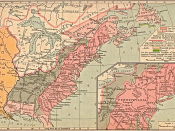The American colonies turned out to be different from what the British had envisioned when they began to colonize the New World. It was, most likely the distance between the new areas that resulted in the various dissimilarities between Great Britain and America. As time passed and changes took place, the Americans were no longer British living in America, but Americans living where they belong. The changes in religion, economics, politics, and social structures illustrate this Americanization of the transplanted Europeans. Between the settlement at Jamestown in 1607 and the Treaty of Paris in 1763, the most important change that occurred in the Colonies was the extension of British ideals far beyond the practice in England itself.
By 1763, although some colonies still maintained establish churches, other colonies had accomplished a virtual revolution for religious toleration and separation of church and state. While Massachusetts was founded for by Puritans for Puritans, other colonies were much more tolerant and open with religion.
Colonies such as Rhode Island was created for everyone, anyone to be able to live in. The colonies were actually made up of melting pots and tossed salads. Many colonies sheltered diverse groups of religion. The Anglican and the Puritan Congregation were the two main dominating denominations of the colonies. The South was influenced by Anglicanism while the New England colonies were influenced by the Puritan Congregation. Although there were tax-supported churches in the colonies, there was still a degree of separation between church and state. However, in England, many aspects of society were still dominated by the powerful Anglican society. This religious disparity between old England and the new colonies served as a key in creating a new American society that differed from the old European society.
In a similar economic revolution, the colonies outgrew their mercantile relationship...


